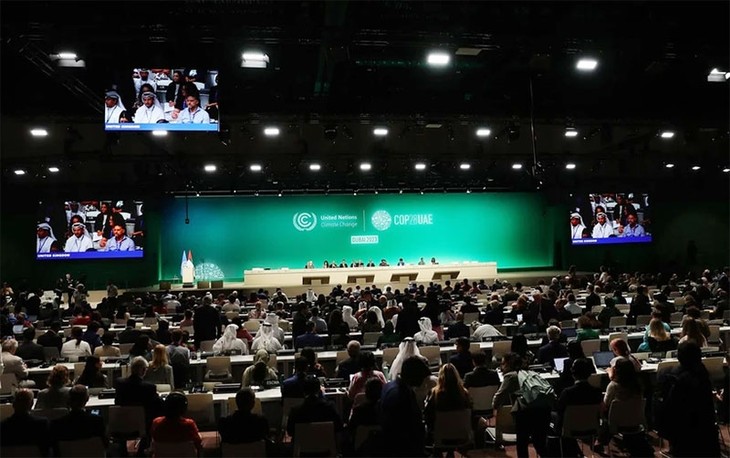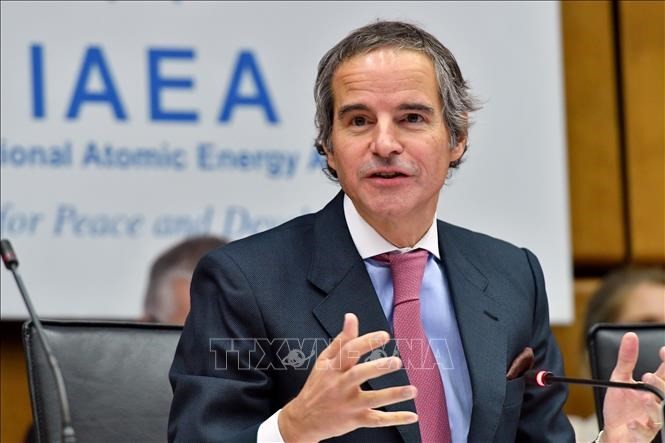(VOVWORLD) -Energy transition is now considered a global priority as the world steps up efforts to achieve climate goals. However, the move from fossil fuels to clean energy still faces many challenges.
 COP28 opened in Dubai on November 30, 2023 (Photo: XNA/ VNA) COP28 opened in Dubai on November 30, 2023 (Photo: XNA/ VNA) |
At the 28th UN Conference on Climate Change (COP28) last December in Dubai the international community reached a historic agreement to gradually phase out fossil fuels. But implementing this commitment won’t be easy.
Future of fossil fuels
One major disagreement is over how long a future of fossil fuels should have.
There are signs that energy transition in some countries may take place faster than expected, thanks to favorable factors such as accelerating renewable energy production, rapid infrastructure building for offshore wind power and solar power, a growing market share for green hydrogen, and milder winters in many parts of the world.
Gas prices are falling sharply. In Europe, wholesale gas last week traded at 24.8 USD/MWh, the lowest level since May 2021 and a fraction of the record price of 345 USD/MWh in August 2022. Some economists say the era of gas, one of the most consumed fossil fuels, has come to an end.
But on February 25, Qatar announced the inauguration of a new gas exploitation complex to increase gas and liquefied natural gas (LNG) output, despite gas prices in the US and Europe hitting record lows. According to QatarEnergy Chairman Saad Al-Kaabi, despite the decline in gas demand in the US and Europe, major markets in Asia are still seeing high demand and gas still has a long-term future.
“We always have been saying that gas is part of the solution for the energy transition and I think a lot of people are now on that bandwagon, and we have been on that track from the beginning. We haven’t changed our view, we still think there is a big future for gas for at least 50 years forward,” said Saad Al-Kaabi.
Nuclear energy is another type of energy that has caused a lot of debate. Currently, most countries and organizations classify nuclear energy as clean energy. The International Atomic Energy Agency (IAEA) will hold a Nuclear Energy Summit in Brussels on March 21-22, where 30 countries will focus on nuclear energy.
At COP28, more than 20 countries, including the US, Japan, and several European countries, called for tripling global nuclear power output by 2050 to achieve climate goals. According to IAEA Director-General Rafael Grossi, more countries are planning to expand their existing nuclear energy program, or integrate nuclear energy into their national energy program, the latest being Canada on February 29.
But energy and environment experts say tense debates on nuclear energy will continue for many more years because safety and the treatment of nuclear waste remain major challenges for many countries.
 IAEA Director-General Rafael Grossi (Photo: XNA/ VNA) IAEA Director-General Rafael Grossi (Photo: XNA/ VNA) |
Challenges to investing in renewable energy
Renewable energy is considered the future of the world. A January report by the International Energy Agency (IEA) said last year’s global renewable energy capacity increased 50% against 2022. The world produced 510 GW of renewable energy, enough to meet the yearly power demand of 51 million households in 2023.
The IEA said global renewable energy capacity could increase 150% by 2030. However, IEA Director Fatih Birol noted that that’s still short of the goal of 200% set at COP28. He said one of the main reasons for the delay is inadequate investment in renewable energy. Giant energy corporations are making record profits from fossil fuels but are lagging behind on their energy transition commitments.
“We see that only 2.5% of their investment go to clean energy and 97.5% go to traditional operations. So there is a major gap, to say the least, what they say they would do and what they do in terms of their investments strategies,” said Birol.
On February 19, Global Witness published a report showing that five major energy corporations, including BP (the UK), Shell (the UK and Netherlands), Chevron (the US), ExxonMobil (the US), and Total Energy (France) had made a record profit of 281 billion USD since February 2022, when the conflict began in Ukraine.
They will pay 100 billion USD in dividends to shareholders instead of investing in energy transition. That behavior defeats efforts to create breakthroughs in renewable energy worldwide.
According to Simon Stiell, Executive Secretary of the UN Framework Convention on Climate Change, the world needs 2.4 trillion USD each year for energy transition, a number that is not being achieved at this time.